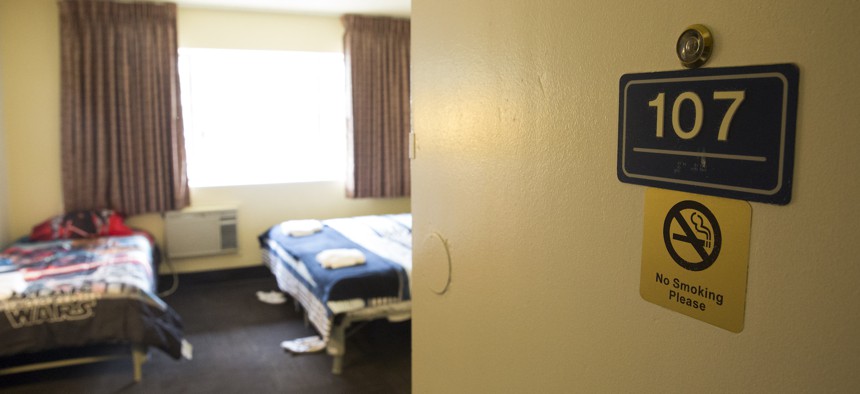Policy
To solve the affordable housing crisis, some communities are turning to hotels
The pandemic presented communities with a unique opportunity to convert hotels into residential spaces, creating everything from temporary transitional housing to long-term supportive homes. Is the model still sustainable?

A former motel room is converted in to a temporary shelter for homeless women and their families in Seattle, Washington. Photo by JASON REDMOND/AFP via Getty Images
Just off Interstate 70 in northeast Denver looms a massive, nine-story hotel, but the building no longer serves as a stopover for ski bums and avid hikers. Instead, a joint effort between the city and a statewide nonprofit will soon convert the structure into more than 200 housing units for extremely-low income households and those experiencing homelessness.
The conversion project is far from the first of its kind. During the COVID-19 pandemic, communities nationwide established non-congregate shelters in hotels and motels that allowed individuals experiencing homelessness to live in a private space. The effort helped slow the spread of the virus and inspired many cities and states to consider sustaining the model well after the end of the public health emergency.
Relatedly, in Florida this year, lawmakers and Gov. Ron DeSantis approved a "Live Local Act," a $711 million plan to make housing more affordable for working Floridians. A priority of Senate President Kathleen Passidomo, it more than doubles funding for housing and rental programs, provides incentives for investment in affordable housing and encourages mixed-use developments in struggling commercial areas.
Passidomo, a Naples Republican, said the goal is to make it possible for people to afford to live in neighborhoods where they work. “Florida has attracted so many new people to move here. And that has just exacerbated the problem,” Passidomo said. “And we don't have one solution to the problem."
In Colorado, any and all efforts to boost affordable housing are sorely needed. The state’s population has steadily grown over the past decade, straining a housing market already at its limits. In a recent poll, nearly 80% of Coloradans said homelessness is a serious problem in the state. Earlier this week, Gov. Jared Polis issued an executive order aiming to reduce red-tape barriers to affordable housing developments.
“Colorado is at a crossroads,” Polis said in a statement. “[W]e can take action to help create more housing now or we can go the way of California where home prices are upwards of $1 million.”
The Clarion Hotel in Denver will soon be known as Renewal Village and is one of the latest projects taken on by the Colorado Coalition for the Homeless. Half the units will be one-room studio apartments, available to those earning up to 50% of the area’s median income. The remaining units will be short-term shelter spaces that include access to clinical care to help stabilize residents before they move to more permanent housing.
“If we do the renovations in a way that we've slated and planned for now, that long-term housing option might be across the hall in one of the units that's been converted to a supportive housing unit, or it could be somewhere else in the community,” said Cathy Alderman, the coalition’s vice president of communications and public policy. The group hopes to begin renovations this fall, building kitchenettes, updating HVAC systems and adding accessibility features for disabled residents where necessary.
For more than a decade, the Colorado Coalition for the Homeless has been partnering with communities to convert hotels into housing, Alderman said. Having affordable units—for which residents pay rent at no more than 30% their income—helps to subsidize the costs of support services.
For the upfront building conversion costs, pandemic relief funds have provided major support, she said, giving communities the opportunity to acquire properties for housing conversions. The Denver project is drawing on funds from the American Rescue Plan Act.
“Whenever you have an infusion of one-time funds, it's great to use that money for acquisitions,” she added.
Converting existing hotels into residential spaces is less costly than building from the ground up. Most deeply affordable housing for households earning less than 30% the area’s median income is funded with tax credits, which developers apply for through a competitive process. But with conversions, the tax credits aren’t necessary because construction costs are much lower, Alderman said.
While Polis is hoping to avoid falling into the same affordable housing challenges as California, the Golden State might hold lessons for developers in Colorado.
California is home to a massive share—about 30%—of the country’s homeless population. Recent research from the University of California found that at least 90% of adults who are experiencing homelessness in the state became homeless while living there primarily because of the extreme scarcity of affordable housing.
California has similarly turned to hotel conversions to quickly provide shelter to people experiencing homelessness. Project Homekey is a statewide initiative that aims to help local governments develop housing for people experiencing homelessness, in part by funding hotel conversions. The project has housed thousands of people since its launch in July 2020.
“The program has been on track to create about 12,000 units in the last couple years, which is quite a bit faster than usual construction of housing dedicated to homelessness,” said Ryan Finnigan, associate researcher for the Terner Center for Housing Innovation at the University of California Berkeley.
Project Homekey, however, appears to be pivoting away from its focus on converting hotels and motels, Finnigan said. Early in the pandemic, when the future of the hospitality industry was unclear, cities could purchase hotels at lower prices than what’s available in today’s market.
There are also fewer buildings left that are suitable for conversion, as communities purchased the “low hanging fruit” early in the pandemic, he added.
As federal pandemic funds dwindle, it's often up to cities and counties to come up with matching funds on their own to receive Project Homekey assistance. In some areas, local housing authorities are creating special housing vouchers for tenants.
But often, cities and counties are left to rework their budgets, paying to maintain converted housing projects with money saved elsewhere. When supportive housing is working as it should, for example, fewer emergency services are required.
Other communities are getting creative in establishing continuous funding sources for conversion projects. Last year, for example, King County, Washington, launched a new policy that allocates 0.1% of sales tax revenue to purchase hotels that can be converted to temporary or permanent housing.
Overall, converting hotels and motels to housing is a difficult, complicated process. Between acquiring funding, establishing on-site services and navigating community pushback, Finnigan said, “it’s chaotic.”
And indeed, the process has not been successful everywhere. In New York, a state program established in 2021 to seize on federal funding and the unique opportunity presented by the pandemic to convert struggling hotels into housing failed.
It received just one application to use the $100 million set aside for the effort. Experts, reported Politico, said costly and burdensome regulations were to blame for the plan’s failures.
But in his research, Finnigan said most operators behind the projects have marveled at the number of people they were able to house in a short period of time.
“I've heard them muse to themselves, ‘How can we make other kinds of homelessness housing happen?” he said. “‘What can we learn from this process that we can export to our usual efforts to create more homelessness housing?’”
The News Service of Florida contributed. A version of this story was first published on Route Fifty.
NEXT STORY: Florida regained control of Miami-Dade County toll roads. Now what?
